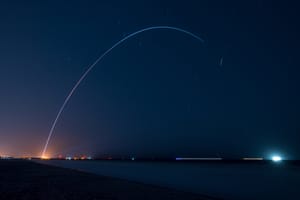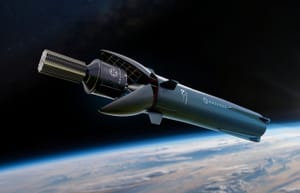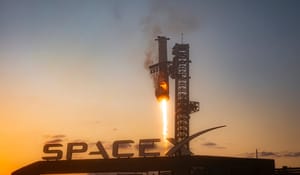
Oct 9, 2023
Five Promising American Aerospace Startups
It is no secret that the aerospace industry is experiencing a boom. From new launch providers, to in space services, the aerospace industry is rapidly growing. Since there are a plethora of new aerospace startups out there, following all of them can be quite hard. So, I decided to create a list of the top five most promising startups in the US.
Before I continue I should note two things, I am defining a startup as any company that has fewer than 5 launches or a company that is less than a decade old. I also would like to clarify that this is my opinion, your top five may be vastly different than mine.
#5 VAST SPACE
Speaking of vastly different opinions, the fifth most promising aerospace startup in my opinion is VAST. VAST shows some serious promise in the long term. It was founded back in 2021 by crypto billionaire, Jed McCaleb. While that may be an off-putting piece of information, and I still am skeptical on VASTS goals, there are some silver linings.
Firstly, VAST is supported by both SpaceX and NASA. VAST has also hired one of NASA's former astronauts to help advise the company. VAST also acquired another startup, Launcher, which will supply VAST with rocket engines for their tugs, among other things. These silver linings don't mean success for VAST is assured, but it gives me hope.
So what does VAST do? Well, VAST plans on building their own space stations that will be put into low Earth orbit (LEO) or beyond, by either Falcon 9 or Starship. These stations will then be crewed via SpaceX's crew dragon or a crewed Starship variant.

Their current roadmap consists of orbital tests from 2023 to 2025. Followed by a single launch station that will fit within a Falcon 9 payload fairing. This station is referred to as "Haven-1" and it can house four crew members. It is planned to be operational in late 2025.
Looking beyond, the company wants to build off of the hopeful successes of Haven-1 and push for larger, more capable stations. With the end goal in the 2040s of a station that can house hundreds of astronauts and be positioned anywhere in the solar system.
#4 IMPULSE SPACE
Impulse Space Propulsion (ISP) is another promising startup. Founded by Tom Mueller in 2021. Tom used to be the CTO of Propulsion at SpaceX, but after 20 years at the company, he retired and started his own project, Impulse.
Impulse Space is working on a few things. One of their projects "MIRA" is a transfer vehicle that satellites can be mounted to. MIRA uses in house engines, propellant/oxidizer tanks, and star trackers, to maneuver payloads to different orbits. MIRA also serves as a deorbiting tool, to reduce potential space junk.

The other main project Impulse is working on is a mission to mars. This mission will be completed via a partnership between Impulse Space and Relativity. Notably, if they are successful, this mission could very well, be the first commercial Martian landing. The two companies currently plan to launch in 2026, on board Relativities Terran R rocket. However, I think a more realistic launch timeline would be Q3 2027-Q4 2028.
#3 Stoke Space
One of the coolest startups out there, Stoke is working on a fully reusable rocket, out of the gates! Founded in 2019, Stoke is working on some seriously impressive stuff, at an impressive rate. Just a few weeks ago, Stoke preformed their first test hop with their "Hopper-2" test vehicle. This test helped validate their innovative and never seen before second stage design.
This second stage design uses 30 thrust chambers around the circumference of the second stage. This design choice creates an aerospike like effect, which increases efficiency.

The innovative second stage design also incorporates a metallic heat shield that is regeneratively cooled. This cooling comes from pressurized propellant flowing through pores. This propellant will help keep temperatures stable while reentering Earths atmosphere.
Stoke has raised around 175 million dollars to help them develop their first rocket, Nova. Not much is known about the rocket itself, but it is expected to carry around 5,000kg (11,000lbs) to LEO.
#2 Firefly Aerospace
Taking the second spot on my list, is Firefly Aerospace. In my opinion, Firefly is one of the most underrated, upcoming launch providers out there. Founded in 2017, the company has launched three times. The first launch was a failure, the second was a partial failure, and on the third try, they successfully launched a payload for the US Space Force.
Firefly is one of the most promising startups, for a few reasons. These reasons pretty much all have to do with how much infrastructure Firefly wants to have. Below, is an example of what they are currently envisioning.

Alpha, their current launch vehicle (LV) boasts a 1,000kg to LEO payload capacity. This capacity blows Firefly's main competitors in the small satellite launch market out of the water. For reference, Rocket Lab, the current dominate small satellite launch provider, can only put 300kgs to LEO per Electron launch.
Firefly's next launch vehicle, the Medium Launch Vehicle (MLV) can boast some 16,000kgs to LEO. This LV will compete with the likes of SpaceX's Falcon 9 and Rocket Labs Neutron rocket. MLV does have future plans on being partially reusable via propulsive first stage recoveries.
Elytra will be an in space tug that will help with mobility to different Earth orbits. It also can be set up to launch deep space missions. Finally, Blue Ghost will provide customers an ability to land on the moon, which will be important in the coming decade when Lunar exploration is on the rise. Firefly is arguably one of the most promising providers out there, beaten out only by my number one pick.
Honorable Mentions
Before we get into my number one pick, let me go over some honorable mentions that I feel deserve some recognition.
Astra

Many may think this is a weird choice, as Astra is nearing bankruptcy and has had a pretty high failure rate. However, I think Astra has long term potential, if and only if Rocket Four succeeds (I mean duh). My case for Astra would be quite long though, so I will leave that for another article, stay tuned.
Think Orbital

By far one of my favorite aerospace companies, Think Orbital is tackling the problem of in space manufacturing, among other things. They currently envision orbital stations, called "Think Platforms" that would host, in-space welding, cutting, inspection, and additive manufacturing technologies for large-scale in-space fabrication. Think Orbital was selected for NASA's CCSC-2 initiative, only strengthening their future potential, as they now can work along side some of the titans in the industry, such as SpaceX.
Spin Launch

By far one of the most unique aerospace companies out there, Spin Launch envisions using centripetal force to help propel rockets towards orbit. This method, while tricky, will reduce cost and propellant needed to get into orbit. Spin Launch has already completed 10 tests of their groundbreaking launching system. Although, these tests were using around 20% of the launchers full power, and only reached heights of 9,100 meters (30,000ft).
Spin launch also envisions orbital class launching systems, that would be enormous in size. I think technology like the stuff Spin Launch is working on, is important for beyond Earth applications. Like the Lunar surface or even Ceres.
#1 Relativity Space
Relativity has to be my top pick, they changed the game back in March, when Terran 1, a rocket that was 85% 3D printed, made it to space. Yes you heard that right, 3D printed. Relativity not only prints most of their rocket engine hardware, but also the main structure of the rocket. This should hopefully allow for quicker build times, cheaper costs, and a more simple end product.

While the maiden launch failed due to a second stage anomaly, the test was a resounding success. Proving to the world that additive manufacturing could with stand the pressure of MAX-Q and any other forces involved with a rocket launch.
While I do wish we saw more of Terran 1, Relativity was so proud of their results, they decided to scrap Terran 1 and jump straight to Terran R. Terran R is a massive heavy lift launch vehicle, that is 82 meters tall, has a diameter of 5.4 meters and a 5 meter tall payload fairing.

Terran R will be a huge thorn in SpaceX's side once completed. Capable of sending 33,500kg (73,000lbs) to LEO when first stage is expended or 23,500kg (51,800lbs) when first stage is reused. These numbers are comparable to SpaceX's Falcon 9, which can put around 17,200kgs (38,000lbs) to LEO when reused, or 22,000kgs (50,000lbs) when expended.
Relativity has won every single contract they have gone for, amassing them some 1.6 billion dollars that they can use to develop Terran R.
This means that Relativity will be a direct competitor to SpaceX and their current monopoly on the launch industry. This competition should help lower costs and increase technological advances.



